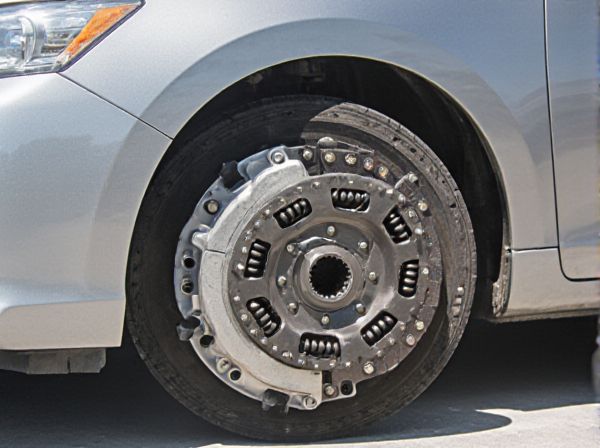
Photo illustration: Hydraulic Clutch vs Mechanical Clutch
Hydraulic clutches provide smoother engagement and require less physical effort compared to mechanical clutches, making them ideal for vehicles with frequent stop-and-go traffic. Mechanical clutches offer a more direct connection and are typically simpler, easier to maintain, and less expensive. Your choice depends on the preference for ease of use versus straightforward mechanics and cost-efficiency.
Table of Comparison
| Feature | Hydraulic Clutch | Mechanical Clutch |
|---|---|---|
| Operation | Uses fluid pressure via master and slave cylinders | Uses direct cable or linkage mechanical connection |
| Pedal Effort | Lower, smoother pedal feel due to fluid hydraulics | Higher pedal effort; may feel stiff or inconsistent |
| Maintenance | Requires fluid checks and bleedings, less frequent adjustments | Requires regular cable lubrication and tension adjustment |
| Durability | Sealed system reduces contamination, lasts longer | Exposed cables prone to wear and snapping |
| Responsiveness | Smoother, more precise clutch engagement | Direct but can be less smooth depending on cable condition |
| Cost | More complex, higher initial cost but less frequent repairs | Lower initial cost, potentially higher maintenance over time |
| Common Usage | Modern cars, performance vehicles, convenience focus | Older vehicles, budget models, off-road simplicity |
Introduction to Clutch Systems
Hydraulic clutch systems utilize fluid pressure to engage and disengage the clutch, providing smoother operation and reduced pedal effort compared to mechanical clutches, which rely on a cable or linkage mechanism. Key components of a hydraulic clutch include the master cylinder, slave cylinder, and hydraulic fluid, while mechanical clutches depend on physical cables and levers for actuation. Understanding these differences in actuation methods is essential for selecting the appropriate clutch system based on vehicle design, maintenance preferences, and performance requirements.
What is a Hydraulic Clutch?
A hydraulic clutch uses fluid pressure to engage and disengage the clutch mechanism, providing smoother and more consistent operation compared to mechanical clutches. It consists of a master cylinder, slave cylinder, and hydraulic fluid, which transmits force from the clutch pedal to the clutch assembly. Hydraulic clutches require less pedal effort and offer self-adjusting capabilities, enhancing driving comfort and reducing maintenance needs.
What is a Mechanical Clutch?
A mechanical clutch operates through a direct cable or linkage system that physically engages and disengages the clutch plates, providing instantaneous feedback and control to the driver. Unlike hydraulic clutches, mechanical clutches rely solely on mechanical force transfer without fluid pressure, making them simpler and easier to maintain but requiring more pedal effort. Commonly used in older vehicles and motorcycles, mechanical clutches offer a straightforward, reliable design suitable for various driving conditions.
Key Differences Between Hydraulic and Mechanical Clutches
Hydraulic clutches use fluid pressure to engage and disengage the clutch, providing smoother operation and requiring less pedal effort compared to mechanical clutches, which rely on a cable or linkage system for actuation. Mechanical clutches tend to be simpler and easier to repair but can demand more physical force and precise adjustments. Hydraulic systems offer self-adjustment features that maintain consistent clutch engagement, improving drivability and reducing maintenance frequency.
Performance Comparison: Hydraulic vs Mechanical Clutch
Hydraulic clutches provide smoother engagement and require less pedal effort due to self-adjusting mechanisms, enhancing driving comfort and control. Mechanical clutches offer a more direct connection with simpler design, but they demand more frequent adjustments and greater pedal effort, impacting long-term performance consistency. Overall, hydraulic clutches excel in durability and ease of maintenance, while mechanical clutches remain favored for straightforward, cost-effective applications.
Maintenance and Reliability Considerations
Hydraulic clutches offer smoother operation and self-adjusting mechanisms that reduce maintenance frequency compared to mechanical clutches, which require regular cable adjustments and lubrication to prevent wear. Mechanical clutches are more prone to cable stretch and mechanical failure, affecting reliability, whereas hydraulic systems maintain consistent performance due to sealed fluid systems minimizing contamination and wear. Despite higher initial costs, hydraulic clutches provide superior long-term reliability and lower maintenance demands, making them preferable for high-performance and heavy-duty applications.
Cost Analysis: Hydraulic vs Mechanical Systems
Hydraulic clutches generally have higher upfront costs due to complex components such as master cylinders, slave cylinders, and hydraulic fluid, but they often offer lower maintenance expenses over time due to self-adjusting capabilities. Mechanical clutches feature simpler cable systems with lower initial purchase prices, though they require more frequent adjustments and cable replacements, increasing long-term maintenance costs. When analyzing total cost of ownership, hydraulic systems usually provide better value for performance-focused vehicles, while mechanical clutches remain cost-effective for budget-oriented applications.
Application Across Various Vehicle Types
Hydraulic clutches provide smoother, more precise engagement and are commonly used in modern passenger cars, light trucks, and motorcycles due to their self-adjusting mechanism and reduced pedal effort. Mechanical clutches are prevalent in older vehicles, heavy-duty trucks, and some performance cars because of their simpler design, lower maintenance requirements, and direct mechanical linkage for rapid response. Both clutch types are selected based on vehicle application, driver preference, and the need for durability or ease of operation across various driving conditions.
Pros and Cons of Hydraulic Clutches
Hydraulic clutches offer smoother engagement and self-adjusting capabilities, reducing pedal effort and wear for enhanced driving comfort and longevity. They require less maintenance compared to mechanical clutches, as the hydraulic fluid self-compensates for clutch disc wear, but they can suffer from fluid leaks and require periodic bleeding to maintain performance. Despite a higher initial cost and complexity in repair, hydraulic clutches provide consistent operation and improved responsiveness, making them preferred in modern vehicles.
Pros and Cons of Mechanical Clutches
Mechanical clutches offer simplicity, lower cost, and easier maintenance compared to hydraulic clutches, making them popular in many vehicles and machinery. Their direct cable or linkage operation provides immediate feedback and quicker response time, but requires more frequent adjustments to maintain optimal performance. However, mechanical clutches can suffer from cable stretch or wear, leading to decreased reliability and inconsistent clutch engagement over time.
 caratoz.com
caratoz.com